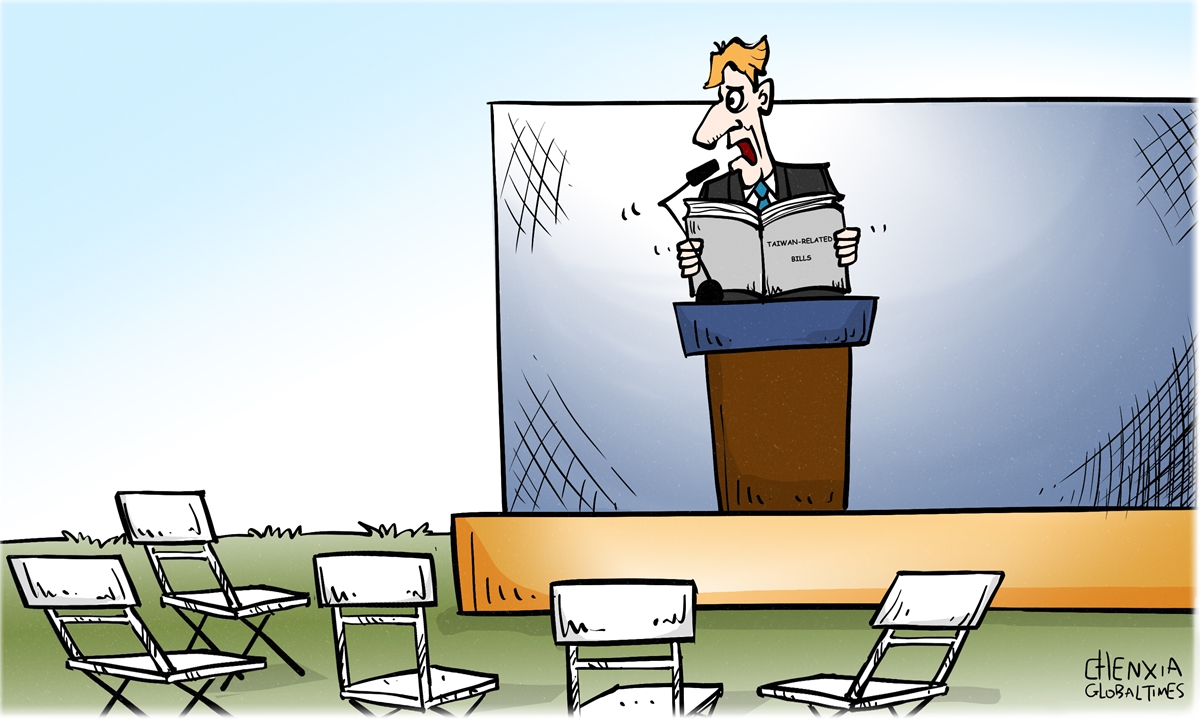
Illustration: Chen Xia/GT
For the seventh year in a row since 2017, the World Health Assembly (WHA) shut its door to the Democratic Progressive Party (DPP) authorities on the Taiwan island.
The 76th WHA, which is being held in Geneva, Switzerland, made a decision on Monday not to include in its agenda a proposal made by some countries, including the US, on the participation of the island of Taiwan in the annual assembly as an observer.
Frankly speaking, the decision made by WHA, the highest decision-making body of the World Health Organization (WHO), is predictable. It reflects that the one-China principle is becoming more and more consolidated in the international community and intergovernmental organizations.
While the majority of the world has applauded the manifestation of the widely accepted one-China principle, some voices from countries that support Taiwan's participation feel "regretful" about the decision. A number of US federal lawmakers, for example, on their social media expressed anger and disappointment at the WHA's "capitulation" to China. Apparently, the normal and correct response of the WHO based on the one-China principle is stigmatized by these American politicians.
But even these politicians have to face the reality that the one-China principle is unshakeable, and anyone who tries to tread on it will only embarrass themselves. Just five days before the opening of the WHA, the US House of Representatives Committee on Foreign Affairs passed the Taiwan International Solidarity Act, which aims to "counter China's attempts to distort United Nations General Assembly Resolution 2758 and undermine Taiwan's participation in international organizations." The WHA's decision on Monday is clearly a setback to another attempt from the US to smear and attack China via its provocative Taiwan-related bills.
Even though the DPP authorities have been rejected by WHA repeatedly, US politicians have been seemingly so persistent in supporting Taiwan's participation in recent years. According to a media report from Taiwan in May 2020, related bills have been introduced in the US Congress five times in the past three years. On May 13, 2022, nine days before the 75th WHA, US President Joe Biden signed a bill into law to support Taiwan's "observer" status.
The persistence of these politicians comes from their own political interests. The "expansion of Taiwan's international space," especially the participation in the WHA, is a big deal to the DPP authorities. Thus, they have spent a lot of money on lobbying US lawmakers in exchange for their support. And in return, to prove their value to the DPP, these US politicians have to show that they truly support the island of Taiwan against the Chinese mainland by constantly introducing related bills that amount to no more than political posturing.
Besides, US politicians have been trying to impose their domestic legislation against the WHO and other international organizations, seeking to influence the international community's recognition of the one-China principle and interfering with their judgments and perceptions of how much international space should Taiwan region have under the one-China principle. Yet, reality has slapped them in the face once and again: It is just utter wishful thinking.
In general, US politicians have stepped up introducing various Taiwan-related bills in recent years. The wording has become increasingly inflammatory, and more specific demands have been included. But this is rather an act of "self-entertainment," as it does not have any practical effect in persuading most countries in the world to abandon or maneuver the widely recognized one-China principle.
Those who support "Taiwan's expansion of international space" in the US, as well as the DPP authorities, need to ask themselves why Taiwan was able to participate in the WHA as an observer between 2009 and 2016. Here is the answer - it was because both sides of the Taiwan Straits agreed on the 1992 Consensus during that period. For the mainland, only on the basis of the one-China principle can Taiwan authorities' participation in the WHA as an observer be reasonable and acceptable.
The one-China principle has played and will always play the most important part in any Taiwan-related issues. Today, it is exactly because of the DPP's reckless refusal to acknowledge this principle that Taiwan has been rejected for the seventh consecutive time since Tsai Ing-wen came to power. And it is only delusional for Washington to turn a blind eye to the DPP's dangerous mind-set of believing it can exert influence on the WHA, or distort and dismantle the one-China principle in front of the world.
The article was compiled by Global Times reporter Xia Wenxin based on an interview with Tong Liqun, a research fellow at the Institute for Taiwan, Hong Kong and Macao Studies of the Shanghai Institutes for International Studies. opinion@globaltimes.com.cn




